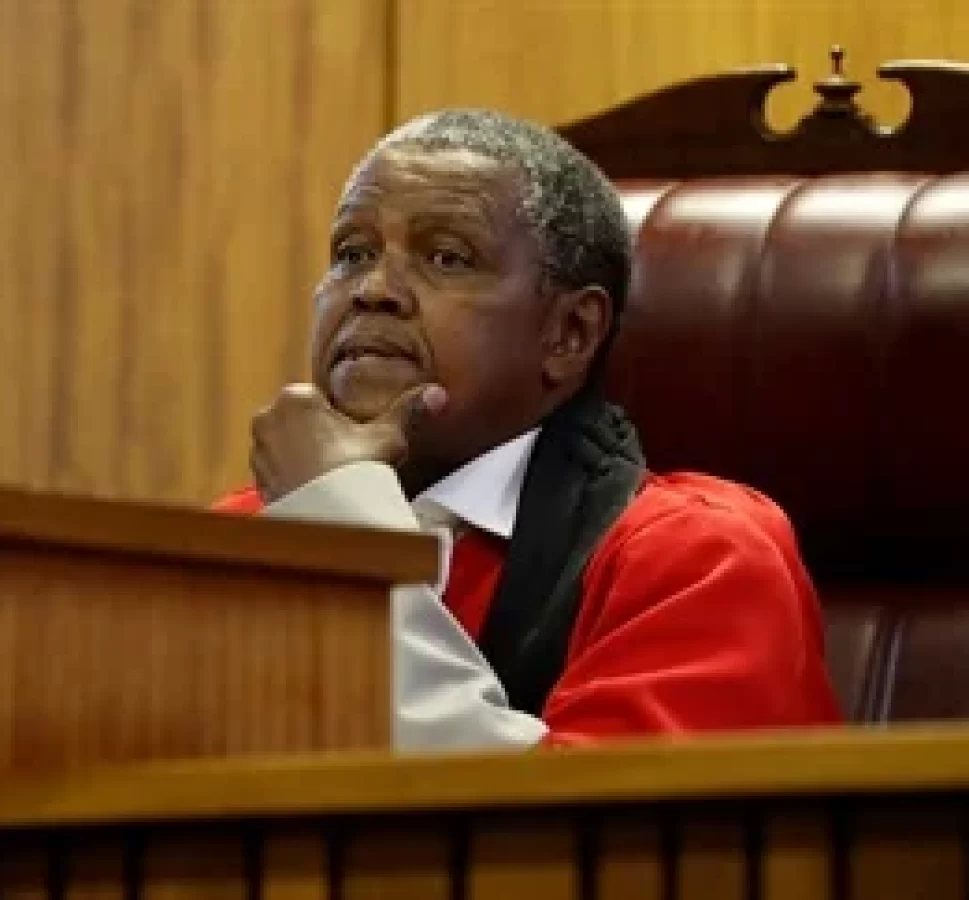
- One of the five men accused of murdering Senzo Meyiwa was recorded while confessing to a magistrate in the presence of his attorney.
- While disputing the confession, Bongani Ntanzi’s defence argued that the audio recording violated his rights and should not be admitted into evidence.
- The trial judge ruled in their favour and the recording was ruled inadmissible.
Judge Ratha Mokgoatlheng has ruled that Bongani Ntanzi’s rights were infringed when he was recorded confessing to his alleged role in the murder of former Bafana Bafana captain Senzo Meyiwa.
Because Ntanzi’s rights were violated, the recording cannot be admitted into evidence.
Ntanzi and his four co-accused appeared in the Gauteng High Court in Pretoria, where they are on trial for the murder of Meyiwa, who was shot and killed while visiting his girlfriend, Kelly Khumalo at her mother’s house in Vosloorus on 26 October 2014.
In a trial within a trial on Friday, Mokgoatlheng handed down judgment on the state’s application to admit the audio recording of Ntanzi completing a confession pro forma document into evidence.
The court is currently hearing evidence on the admissibility of confession statements allegedly made by Ntanzi and Muzikawukhulelwa Sibiya.
News24 previously reported that Magistrate Vivian Cronje, who took down Ntanzi’s confession in June 2020, testified that she had recorded the audio of the entire deposition, including the completion of the pro forma document and the actual confession statement.
However, she did not inform Ntanzi or his lawyer, who was present during the deposition, about the recording.
While the state originally did not intend leading evidence on the pro forma part of the recording, the prosecutor, Advocate George Baloyi, said there were certain aspects not contained in the document which are important to determine whether the statement was made freely and voluntarily.
The defence teams objected to this, arguing that Ntanzi’s rights were infringed because he was not informed about, nor did he give his consent to, being recorded.
They further said that, because of the infringement, the recording would render the trial unfair and be detrimental to the administration of justice.
Baloyi argued that, based on the Regulation of Interception of Communications and Provision of Communication-Related Information Act, Ntanzi’s rights were not violated.
He contended that the recording was effectively an electronic version of what Ntanzi told the magistrate, so there was no room to argue his rights to privacy were infringed.
“He was in front of a magistrate to make the statement. All the magistrate did was keep a record of the meeting.”
The court rejected the state’s arguments that there were no violations and that the recording was an electronic version of Ntanzi’s confession.
Mokgoatlheng found that Ntanzi’s rights and dignity were infringed when he was not informed and, therefore, could not consent to the audio recording.
“In this case, I am of the view that accused number two’s rights to a fair trial were infringed by the making of the audio recording by Magistrate Cronje,” Mokgoatlheng said.
The court further said the act was an egregious and flagrant abuse of Ntanzi’s rights.
As a result, Mokgoatlheng dismissed the state’s application, ruling that the audio recording was inadmissible.
While this ruling grants a slight reprieve for Ntanzi, the court still needs to rule on the admissibility of the alleged confession statement. In addition, the ruling on the audio recording has no bearing on the rest of the trial within a trial.
News24 previously reported that, in her evidence-in-chief, Cronje testified that Ntanzi was cool and calm during his confession, with no visible injuries.
According to his answers on the pro forma, Ntanzi said he had not been assaulted, threatened, influenced, encouraged or promised anything by anyone, including the police, to make the confession.
He added that he had no recent injuries or bruises.
Cronje told the court that, after completing the pro forma and taking the confession, she, the interpreter and Ntanzi signed each page.
Ntanzi has challenged the confession statement, claiming that it was done under duress, that he did not sign the document, and that it was not made freely and voluntarily as the pro forma inferred.






